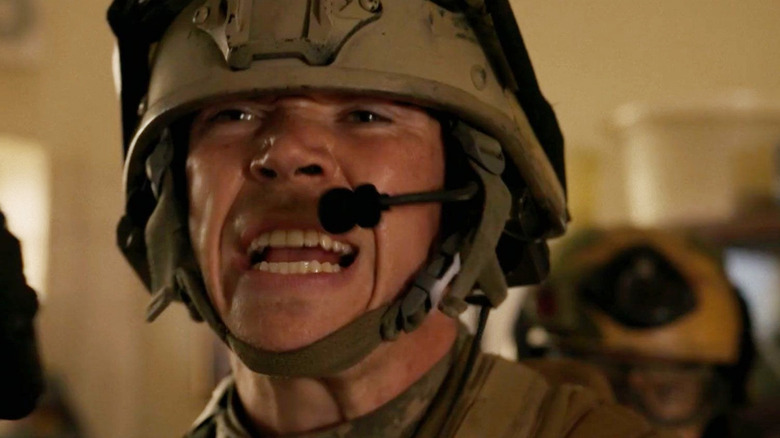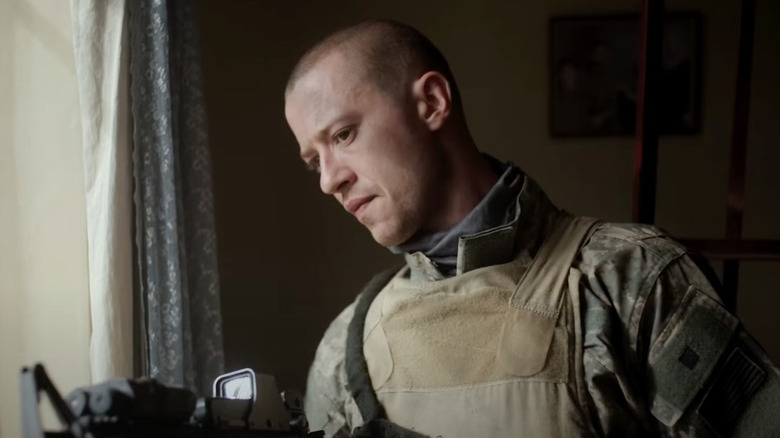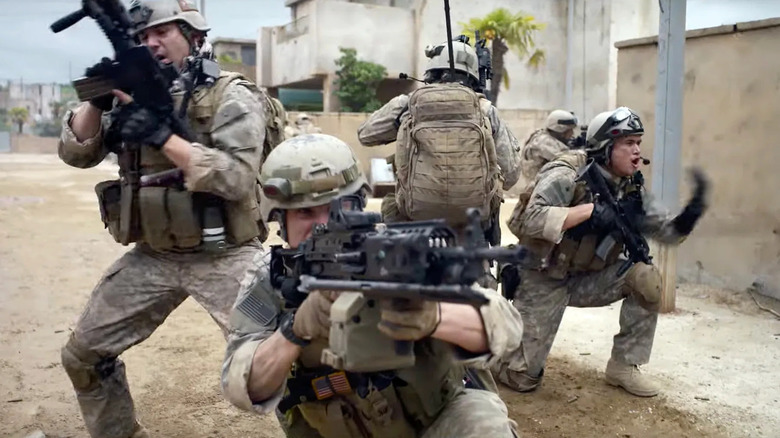Why Warfare Is Going To Anger People On Both Sides Of The Political Spectrum
The movie "Warfare," as co-directed by Alex Garland and Ray Mendoza, is one of the most directly visceral war films ever made. The filmmakers' camera hangs, like a fascinated extraterrestrial, on tiny details, observing them as if they were recording biological field notes. Viewers can practically feel the textures of the soldiers' guns, the weight of their enormous uniforms, and the temperature of the rooms they're in. When the IEDs begin exploding, the audio begins to fade in and out, the film's boom mics seemingly existing within the ears of whatever soldier we're looking at during that moment. There's a lot of screaming and bleeding and panic.
"Warfare" takes place in Iraq in 2006, detailing a very specific battle during George W. Bush's broad and chaotic War on Terror. Garland and Mendoza constructed their film entirely from the memories of the soldiers involved, and built the film's sets based on photos taken in the heat of the fighting. Indeed, Mendoza was one of those soldiers, having served as a communicator. (Actor D'Pharaoh Woon-A-Tai plays Mendoza in the film.) The cameras stay with the U.S. soldiers throughout the whole movie, either standing right next to them or seeing their perspective through spy cameras, allowing audiences to see where they are on the battlefield. "Warfare" has the most astonishing sense of spatial continuity of any film.
Frustratingly, "Warfare" also doesn't seem to have a point of view. There is no talk of what the function of this battle is or what's at stake if its leads win or lose. There are no discussions about Bush, the meaning or meaninglessness of the whole war, or how Americans feel about Iraq or Iraqis. The soldiers themselves are not depicted as heroes or villains, but as mere working stiffs who sometimes do brave things and sometimes do awful things. This is not an anti-war film like "All Quiet on the Western Front" or a work of jingoism like "Act of Valor." It's neutral.
What is Warfare about?
Anyone with any political point of view is going to exit "Warfare" rattled and shocked, if also weirdly disappointed. It doesn't seem to have any feelings about the Iraq War or the U.S.' role in it. The film opens with a group of soldiers watching a sexy, soft-core workout video, hooting and hollering at the buttocks on display, perhaps implying that their aggressive heterosexuality may tie into their role as "manly" freedom fighters. However, those images and ideas cease once the battle begins. The film doesn't include any further symbols or discussions of sexuality or masculinity.
There is a scene partway through "Warfare" when a grievously injured man is wailing in pain, at which point another soldier enters his stronghold and starts barking epithets about toughness. He approaches the injured man and yells things like "You got this! You're tough!" That man is largely ignored, though, as all the other soldiers (Will Poulter, Cosmo Jarvis, and Charles Melton among them) are more concerned with their evacuation as they come under heavy fire. "Warfare" is more about the logistics of volleys and counter-volleys, as well as the scheduling of evacuations, than anyone's individual toughness. It's not about bravery or cowardice. It's just about the experience.
As it so happens, this was the point. Speaking in an interview with /Film, Garland and Mendoza affirmed that "Warfare" is meant to be intimate to the point of losing its thesis. Garland referred to cinema as a broad church, stating:
"Within that broad church, you could have a film about combat, which is attempting to be as honest and faithful as possible. And I would have to say that honesty has to involve a kind of neutrality in the presentation of facts."
Garland backed off from his own movie, more or less saying that interpretation was the job of critics and viewers.
Garland did something similar with Civil War
Garland added that, when it comes to war, mere observation is enough in some cases. Other filmmakers, he remarked, are fine to have a thesis when it comes to war, but he didn't want one. He continued:
"This is just the space we choose to occupy with this film. The reason being that there is an inherent value in just trying to be as honest as you can about what war is like and to listen to the experiences of people who have actually been at war. Just to simply listen to it and take it in, sort of take it into account. It's almost incumbent on us, I would say. Again, it doesn't have to be the whole picture. You can have another movie which is doing a whole other thing, but that's what this movie is trying to do."
Of course, by making the film incumbent on us, Garland seems to be shrinking away from any moral responsibility. He is the one making a movie about combat and selected this story to tell. Saying the story is only a mirror suggests that he has no feelings about Iraq, American soldiers, or war in general. And that's a frustrating point of view to affect.
Garland did something similar with his 2024 film "Civil War," a dystopian movie for the Trump era. The film takes place in the near future at a point when the U.S. has been thrown into a self-destructive, well, civil war. The cause of the war, however, and the ideologies of the sides fighting are never made clear. Why did the U.S. begin a second civil war? There is no explanation. Garland takes a neutral stance, merely explaining that war, no matter the cause, hollows you out. It's a fine thesis, of course, but it could have been made without employing such politically fraught images.
Garland has no perspective on the George W. Bush years either, it would seem. "Warfare" is apolitical. And that, some might say, is a failing.
"Warfare" is now playing in theaters.


